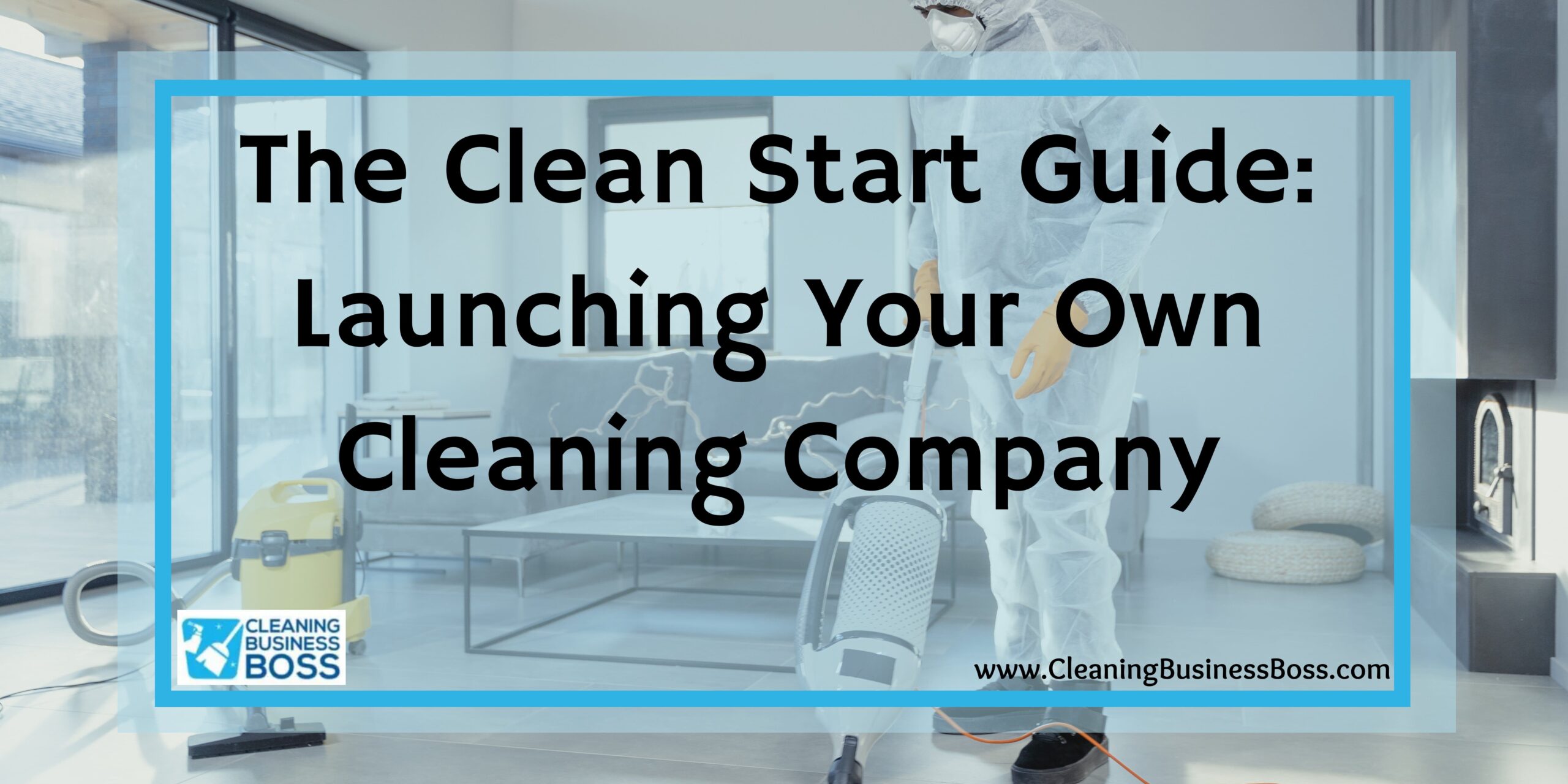Starting a cleaning company can be a beneficial business venture for aspiring entrepreneurs. In today’s fast-paced world, many individuals and businesses require professional cleaning services to maintain clean and healthy environments. However, launching a cleaning company involves more than just purchasing cleaning supplies and advertising services.
Start a cleaning company with thorough research, a solid business plan, and equipment and supplies. Train staff, provide exceptional service, build strong client relationships, and adapt to market demands for a profitable venture.
Research and Planning

Before embarking on any entrepreneurial journey, thorough research and planning are vital. This initial stage sets the foundation for a solid business strategy and helps you understand the market, competition, and target audience.
Market Analysis
Conducting a comprehensive market analysis is essential for starting a successful cleaning company. Begin by assessing the local cleaning industry to understand its dynamics, competition, and potential opportunities. Study the demand for cleaning services in the area, taking into account factors such as population demographics, income levels, and lifestyle patterns.
Identify your target markets, whether residential, commercial, or both, and evaluate the existing competitors in those segments. Look for gaps in services that you can potentially fill, such as specialized cleaning needs or underserved industries. By gaining a deep understanding of the market, you can tailor your services to meet specific demands and develop a competitive edge.
Define Your Niche
To stand out in a crowded market, it’s important to define your cleaning company’s niche. Determine your unique selling proposition (USP), which sets you apart from competitors. Consider the types of cleaning services you want to offer—residential, commercial, or a combination—and identify any specialized services you can provide, like carpet cleaning or window washing.
You can focus on a specific industry or market segment, such as medical facilities, hospitality, or eco-friendly cleaning. By narrowing down your target market and specializing in specific services or industries, you can better tailor your marketing efforts, pricing strategies, and service offerings to attract and retain clients who value your expertise.
Business Structure and Legal Considerations
Choosing the right business structure and addressing legal considerations are crucial steps when starting a cleaning company. Evaluate the various options, such as a sole proprietorship, partnership, LLC, or corporation, and select the structure that aligns with your business goals, risk tolerance, and growth plans. Consult with a legal professional to ensure compliance with local laws and regulations, and obtain the necessary licenses and permits required to operate your cleaning business.
It’s also important to secure appropriate insurance coverage, such as general liability insurance and worker’s compensation insurance, to protect your business, employees, and clients. By establishing a solid legal foundation, you can operate your cleaning company with peace of mind and focus on delivering quality services.
Check out our article to know the steps in starting up your cleaning business.
Developing a Business Plan

A well-crafted business plan serves as a roadmap for your cleaning company’s success. It outlines your goals, strategies, financial projections, and marketing approaches.
Executive Summary
The executive summary provides a condensed overview of your cleaning company, highlighting its key elements. Describe your company’s mission and vision, emphasizing the unique features that set you apart from competitors. Briefly outline the services you offer, whether it’s general cleaning, deep cleaning, maintenance, or specialized services.
Clearly define your target market, whether residential, commercial, or both, and highlight any competitive advantages you possess, such as eco-friendly practices, advanced technology, or exceptional customer service. This section serves as an enticing introduction to your business, capturing the reader’s attention and giving them a glimpse of what your cleaning company is all about.
Services and Pricing
In this section, provide detailed information about the cleaning services your company offers. Explain the scope of each service, including specific tasks and areas covered. Discuss the quality standards you adhere to, the cleaning products and equipment you utilize, and any certifications or training that sets your team apart. When establishing pricing, consider factors such as the market rates, the complexity and time required for each service, and your desired profit margins. Conduct market research to ensure your pricing is competitive yet profitable, reflecting the value and quality of your services.
Marketing and Sales Strategy
Outline your marketing and sales strategy to attract customers and promote your cleaning company. Identify your target audience and develop a comprehensive plan to reach them effectively. This may involve a combination of online marketing efforts, such as website optimization, social media marketing, and online directories, as well as traditional marketing channels like local advertising, direct mail, or networking events.
Consider building strategic partnerships with businesses or professionals in related industries to expand your reach. Outline your approach to generating referrals and leveraging positive customer experiences to build a strong reputation in the community.
Financial Projections
Present realistic financial projections that demonstrate the potential profitability of your cleaning company. Include detailed information on startup costs, such as equipment purchases, licensing fees, and initial marketing expenses. Break down monthly expenses, including employee wages, cleaning supplies, insurance premiums, and overhead costs.
Forecast your revenue based on market demand, pricing strategy, and estimated client acquisition rates. Be conservative in your projections, considering potential challenges or seasonal variations. Utilize financial tools or consult with an accountant to create accurate projections that highlight your business’s viability and potential for sustainable growth.
Acquiring Equipment and Supplies

To run a professional cleaning company, you need the right equipment and supplies to deliver high-quality services efficiently.
Cleaning Equipment
Investing in high-quality cleaning equipment is crucial for delivering exceptional service. Purchase essential equipment such as vacuum cleaners, mops, brooms, dusters, steam cleaners, pressure washers, and carpet cleaning machines. Research reputable brands known for their durability and performance. Consider the specific needs of your target market and the services you offer when selecting equipment.
For example, if you focus on residential cleaning, lightweight and versatile equipment may be ideal. If you specialize in commercial or industrial cleaning, you may require heavy-duty machinery. Invest wisely to ensure your equipment meets the demands of your clients and helps you achieve efficient and effective cleaning results.
Cleaning Supplies
Source reliable cleaning supplies to support your cleaning operations. This includes eco-friendly cleaning solutions, disinfectants, microfiber cloths, gloves, trash bags, and other consumables. Look for suppliers that offer high-quality products and environmentally friendly options. Consider partnering with suppliers or wholesalers to access bulk discounts, allowing you to optimize your procurement costs.
Research and compare prices, read product reviews, and prioritize supplies that are effective, safe, and sustainable. By using top-notch cleaning supplies, you can maintain high standards of cleanliness and hygiene, and provide your clients with exceptional service that meets their expectations.
Vehicle and Transportation
If your cleaning company offers on-site services, having a reliable vehicle is essential. Select a vehicle that can comfortably accommodate your equipment, supplies, and cleaning team while projecting a professional image. Consider factors such as storage space, fuel efficiency, and vehicle maintenance costs. Choose a vehicle size that suits the scale of your operations and the number of staff members or equipment you need to transport.
It’s also beneficial to brand your vehicle with your company logo and contact information, effectively promoting your business while on the move. A well-maintained and properly equipped vehicle ensures that you can efficiently reach your clients’ locations and deliver your cleaning services promptly and professionally.
Hiring and Training Staff

Building a competent and reliable team is crucial for the success of your cleaning company. Clients expect well-trained professionals who can deliver excellent cleaning results.
Recruitment Process
Define the roles and responsibilities within your cleaning company, including cleaners, supervisors, and administrative staff. Develop a structured recruitment process that begins with crafting clear job descriptions and qualifications. Advertise job openings through various channels, conduct interviews to assess candidates’ skills and fit with your company culture, and perform reference checks and background screenings to ensure the credibility of potential employees.
Consider involving key team members in the interview process to gather diverse perspectives. By establishing a thorough recruitment process, you can attract and select qualified individuals who align with your company’s values and contribute to its success.
Training Programs
Implement comprehensive training programs to enhance your staff’s cleaning skills, efficiency, professionalism, and customer service. Develop a training curriculum that covers cleaning techniques, equipment usage, safety protocols, and customer interaction. Offer both initial onboarding training and ongoing education to keep your employees updated on industry best practices, new technologies, and emerging trends.
Provide hands-on training opportunities and access to relevant resources, such as training manuals or online courses. Regularly evaluate the effectiveness of your training programs and seek feedback from your employees to continuously improve their learning experience. Investing in their development will result in a skilled and motivated workforce that consistently delivers high-quality cleaning services.
Employee Retention and Motivation
Create a positive work environment that prioritizes employee satisfaction and fosters loyalty. Offer competitive wages and benefits packages to attract and retain top talent. Recognize and reward outstanding performance through employee appreciation programs or incentive schemes. Provide opportunities for career growth and advancement, such as additional responsibilities or specialized training. Foster open communication channels where employees can voice their concerns or ideas.
Encourage teamwork, collaboration, and a sense of belonging within the company. Conduct regular performance evaluations to provide constructive feedback and identify areas for improvement or further development. By prioritizing employee retention and motivation, you can cultivate a dedicated and loyal team that is committed to delivering exceptional service and contributing to the overall success of your cleaning company.
Establishing Strong Client Relationships

Building strong relationships with clients is essential for a successful cleaning company. Satisfied clients become loyal customers and may refer your services to others.
Customer Service Excellence
To differentiate your cleaning company, prioritize customer service excellence. Develop a customer-centric approach by actively listening to your clients, addressing their concerns promptly, and ensuring open lines of communication. Train your staff to provide exceptional service, emphasizing professionalism, responsiveness, and attentiveness.
Regularly seek feedback from clients through surveys or follow-up calls to gauge their satisfaction and identify areas for improvement. Actively implement necessary improvements based on client feedback to continuously enhance your service delivery. By focusing on exceptional customer service, you can build strong relationships, foster customer loyalty, and generate positive word-of-mouth referrals.
Customized Cleaning Plans
Set yourself apart by offering customized cleaning plans tailored to the unique needs and preferences of each client. Conduct thorough consultations to understand their specific requirements, and develop flexible cleaning schedules that accommodate their preferences. Offer options for additional or specialized services based on their specific needs. Provide transparent pricing models that reflect the scope of work and individualized services. By personalizing your cleaning plans, you demonstrate attentiveness and a commitment to meeting your clients’ expectations, increasing their satisfaction and loyalty to your company.
Quality Assurance
Implement rigorous quality control measures to maintain high cleaning standards. Conduct regular inspections of completed work to ensure consistent quality. Provide checklists or guidelines to your cleaning staff to ensure all necessary tasks are completed to satisfaction. Promptly address any issues or complaints raised by clients and take corrective actions to rectify them. Emphasize the importance of attention to detail and thoroughness in cleaning procedures. By prioritizing quality assurance, you instill confidence in your clients, earn their trust, and position your cleaning company as a reliable and reputable service provider.
Scaling and Growth Strategies

Once your cleaning company is established and running smoothly, you can explore opportunities for expansion and growth.
Referrals and Word-of-Mouth Marketing
Harness the power of satisfied clients by actively encouraging them to refer your cleaning services to their friends, family, and business associates. Implement a referral program that offers incentives or discounts for successful referrals. Provide referral cards or digital referral mechanisms to make it easy for clients to recommend your services.
Foster positive relationships with your clients by consistently delivering exceptional service, exceeding their expectations, and maintaining open lines of communication. Satisfied clients are more likely to spread the word about your cleaning company, generating valuable word-of-mouth marketing and expanding your client base organically.
Additional Services
Consider expanding your service offerings to include related services that complement your core cleaning services. This could include organizing services, window cleaning, floor restoration, or specialized services like green cleaning options. By diversifying your offerings, you can attract new clients who may have different cleaning needs or preferences.
Conduct market research to identify demand for these additional services and assess their profitability. Develop the necessary expertise and training to ensure quality service delivery. Marketing these additional services to your existing client base and through targeted advertising can help increase revenue streams and position your cleaning company as a one-stop solution for all cleaning needs.
Strategic Partnerships
Collaborate with complementary businesses to establish strategic partnerships that benefit both parties. Identify businesses that cater to a similar target market but offer different services, such as property management companies, real estate agents, or event planners. Propose mutually beneficial arrangements, such as cross-promotion or referral partnerships, where both businesses can refer clients to each other.
This can provide access to a new pool of potential clients and expand your reach. Actively network within your local business community to identify partnership opportunities. By leveraging strategic partnerships, you can tap into established client bases and create synergistic relationships that enhance the growth and visibility of your cleaning company.
Check out our article to learn more on starting your cleaning business.
Summary
Starting a cleaning company requires careful planning, dedication, and a customer-centric approach. By conducting thorough research, developing a comprehensive business plan, providing excellent service, and continually adapting to market demands, you can position your cleaning company for success.
Remember, consistent effort, ongoing learning, and a commitment to customer satisfaction are key to building a reputable and valuable cleaning business.
Frequently Asked Questions
Can I start a cleaning company as a sole proprietor?
Yes, starting as a sole proprietor is a common choice for many cleaning businesses. However, consider consulting with a legal professional to understand the legal implications and tax obligations associated with your business structure.
Should I specialize in a specific cleaning niche?
Specializing in a specific cleaning niche can help differentiate your business and target a specific market. Assess the demand and competition in your area to determine if specializing will give you a competitive advantage.
How can I differentiate my cleaning company from competitors?
Differentiate your cleaning company by offering exceptional customer service, using eco-friendly products, providing additional services, implementing cutting-edge cleaning technologies, or specializing in a specific niche.
To learn more on how to start your own cleaning business, check out my startup documents here.
Please note that the contents of this blog are for informational and entertainment purposes only and should not be construed as legal advice. Any action taken based on the information provided in this blog is solely at your own risk. Additionally, all images used in this blog are generated under the CC0 license of Creative Commons, which means they are free to use for any purpose without attribution.

About the author. Entrepreneur and Cleaning Business Fan.
Hi! I am Shawn and I am a happy individual who happens to be an entrepreneur. I have owned several types of businesses in my life from a coffee shop to an import and export business to an online review business plus a few more and now I create online cleaning business resources for those interested in starting new ventures. It’s demanding work but I love it. I do it for those passionate about their business and their goals. That’s why when I meet a cleaning business owner, I see myself. I know how hard the struggle is to retain clients, find good employees and keep the business growing all while trying to stay competitive.
That’s why I created Cleaning Business Boss: I want to help cleaning business owners like you build a thriving business that brings you endless joy and supports your ideal lifestyle.


